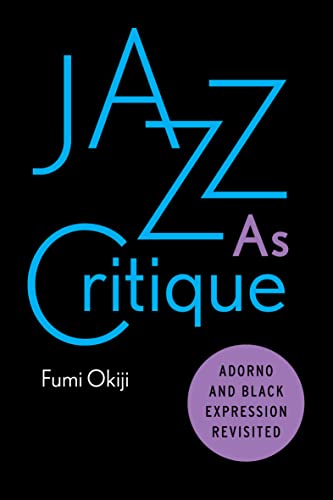Jazz As Critique
Adorno and Black Expression Revisited
Fumi Okiji
BOOK REVIEW

In the realm of music criticism, few voices resonate with the profundity and complexity of Fumi Okiji's Jazz As Critique: Adorno and Black Expression Revisited. This title isn't just a dense academic treatise; it's a clarion call, compelling us to reassess the very essence of jazz, its cultural significance, and its entanglement with critical theory, particularly through the lens of Theodor Adorno. Okiji doesn't merely scratch the surface; she plunges into the deep, swirling currents of jazz, melding it with the philosophical inquiries that Adorno posited, creating a tapestry that is as rich and diverse as the music itself.
Jazz is a genre deeply embedded in the fabric of Black identity and experience. Yet, this book challenges you to confront uncomfortable truths about its commodification and the often inequitable systems that have historically dictated its narrative. Think about it: how many of us listen to a jazz standard and merely appreciate the sound, the rhythm, the melody, without acknowledging the blood, sweat, and tears of its originators? Through Okiji's probing analysis, you're invited not only to listen but to feel this music on a visceral level, to engage with its shadows and silences.
As you delve into the pages, you're struck by Okiji's unique ability to weave together jazz with cultural critique. This isn't just a postmodern exercise in intellectual gymnastics; it's rooted in the urgent realities of racial politics, making it a vital text in our contemporary landscape. Discussions about Black expression and the struggle for authenticity in art become visceral and immediate, turning the book into a mirror reflecting the socio-political turmoil of our time. Jazz, in Okiji's discourse, becomes a powerful medium of resistance, a way of articulating identity beyond the confines of mainstream understanding.
The reception of this book is as varied and layered as the music it discusses. Some readers laud Okiji for her groundbreaking connections, praising how she positions Adorno's often-criticized views in conversation with the vibrant tapestry of Black artistic identity. Critics, however, question whether the philosophical approach overshadows the very essence of jazz as a lived experience. This tension is akin to the argument surrounding jazz itself-a form of art that is as much about improvisation as it is about structure. You've got dissent and agreement swirling like a complex improvisational solo, and that's the beauty of this text. It plays with complexity.
Moreover, Okiji's historical lens reveals how jazz has evolved, reflecting broader cultural shifts while remaining irrevocably linked to the struggles faced by Black Americans. The question arises-can we truly separate jazz from its roots in trauma and triumph? This isn't merely an academic exploration; it's a necessary conversation that stirs your consciousness and prompts an intellectual awakening. If you think jazz is just about the sound, drop that notion like a stale note. This book shakes you awake, making you rethink what you know (or thought you knew) about the intricacies of jazz and its critique.
But beyond the philosophical debates and cultural critiques, what stands out is Okiji's passionate voice. Her scholarship is imbued with a rhythm that mirrors the very music she discusses, inviting you to dance through her words while pondering the profound implications of her arguments. As she traverses through the lives of jazz legends, you're reminded of the human stories behind the artistry. Each chapter echoes the jazz itself-improvisational, layered, and deeply reflective.
In a world pervaded by superficial engagements, Jazz As Critique serves as a reminder of the power of art as a vehicle for social change. By engaging with Okiji's insights, you will undoubtedly emerge with a stronger sense of responsibility towards the narratives we inherit and perpetuate. The shadows of the past loom large, but within them lies the possibility of transformation and hope.
Prepare to feel transformed. This isn't just a book about jazz; it's an essential exploration of identity, politics, and the very act of expression itself. Don't let this opportunity slip through your fingers. Engage with the echoes of history, challenge the status quo, and immerse yourself in a dialogue that demands your attention-not just as a reader, but as part of a larger conversation about music, culture, and the enduring fight for recognition and respect. Your understanding of jazz will never be the same again.
📖 Jazz As Critique: Adorno and Black Expression Revisited
✍ by Fumi Okiji
🧾 162 pages
2018
#jazz #critique #adorno #black #expression #revisited #fumi #okiji #FumiOkiji